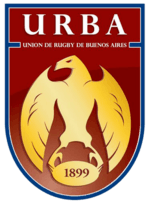Unión de Rugby de Buenos Aires
| Unión de Rugby de Buenos Aires | |
|---|---|
 | |
| Sport | Rugby union |
| Founded | 1995 |
| UAR affiliation | 1995 [1] |
| President | Luis Gradín |
| Men's coach | Rafael Madero |
| Website | urba.org.ar |
The Buenos Aires Rugby Union (Spanish: Unión de Rugby de Buenos Aires), usually referred as URBA, is the Argentine governing body that organises and controls the rugby union in the Buenos Aires Province (including the main district, Buenos Aires autonomous city), as well as its representative team for the Campeonato Argentino organised by the Argentine Rugby Union (UAR).
The union only deals with clubs from the city of Buenos Aires and part of the Buenos Aires Province; the remaining clubs from the province are distributed amongst four other unions: Unión de Rugby del Oeste de Buenos Aires in the west, Unión de Rugby del Centro de la Provincia de Buenos Aires in the centre, Unión de Rugby de Mar del Plata in the east, and Unión de Rugby del Sur in the south.
URBA organises the Torneo de la URBA, the strongest club competition in Argentina, with 75 clubs directly affiliated and 17 competing as guests.[2] The Union is the most powerful of the provincial organisations of Argentina, having provided more than half of the players for the Argentina national team.
History
The "River Plate Rugby Union" (RPRU) was established in 1899 in Buenos Aires by four clubs, Buenos Aires F.C., Belgrano A.C., Lomas A.C. and Rosario A.C..[3] The body organized the first edition of the Buenos Aires' inter-club competition that same year, with Lomas being the first Argentine champion.[4] In 1951, the change of name to Spanish "Unión Argentina de Rugby", was after a request by the Argentine Olympic committee and it continued at the same time to work as local federation of Buenos Aires clubs, and national federation, recognized by International Rugby Board.
As a result of a restructuring of the Argentine rugby in 1995, the "Union de Rugby de Buenos Aires" was created with the purpose of organising competitions in the city district and nearest towns like San Isidro and La Plata, while the remaining part of the Buenos Aires Province (including populous cities like Mar del Plata or Tandil) remained under other provincial unions. Therefore, the RPRU championship was renamed "Torneo de la URBA" and continued with the same format, while the Argentine Union (UAR) took over national teams only.
Tournaments
As of 2018, several competitions are organised by the URBA. The first division is the Top 12, contested by the 12 best teams of the Buenos Aires area and also the oldest competition of Argentina.
The URBA league system completes with Primera División (unlike its name indicates, it is the second division), Primera B (third) and Primera C (fourth divvision), with 14 clubs competing in each one.[5]
Union team
The Buenos Aires team –nicknamed Las Águilas (The Eagles)– is the most successful within the provincial teams in Argentina, having won 37 Campeonato Argentino titles to date.
Titles
Domestic
- Campeonato Argentino (37): 1962, 1963, 1964, 1966, 1967, 1968, 1969, 1970, 1971, 1972, 1973, 1974, 1975, 1976, 1977,
1978, 1979, 1980, 1981, 1982, 1983, 1984, 1986, 1991, 1994, 1996, 1998, 1999, 2000, 2002, 2003, 2006, 2007, 2008, 2015, 2016, 2017
International
- World Club Sevens (1): 2014
International friendly competition
The URBA team has also played several international friendly matches against national teams that were touring Argentina, with several wins against some of them. Below is the list of matches:
| Date | Rival | Result |
|---|---|---|
| 24 May 1997 | England | 26–23 |
| 30 Oct 1993 | South Africa | 28–27 |
| 15 Jun 1996 | France | 29–26 |
| 24 May 1997 | England | 23–21 |
| 16 Jun 1998 | France | 36–22 |
| 29 May 1999 | Wales | 31–29 |
References
- ↑ Historia de la URBA
- ↑ Guía de clubes on URBA website, 29 June 2018
- ↑ ""Hechos históricos de la Unión" at UAR website". Archived from the original on 2013-02-19. Retrieved 2013-02-19.
- ↑ "Leslie Corry Smith, el primer referee oficial de Argentina", by Rubén Ayala at Lomas AC website
- ↑ Fixture 2017 on URBA website